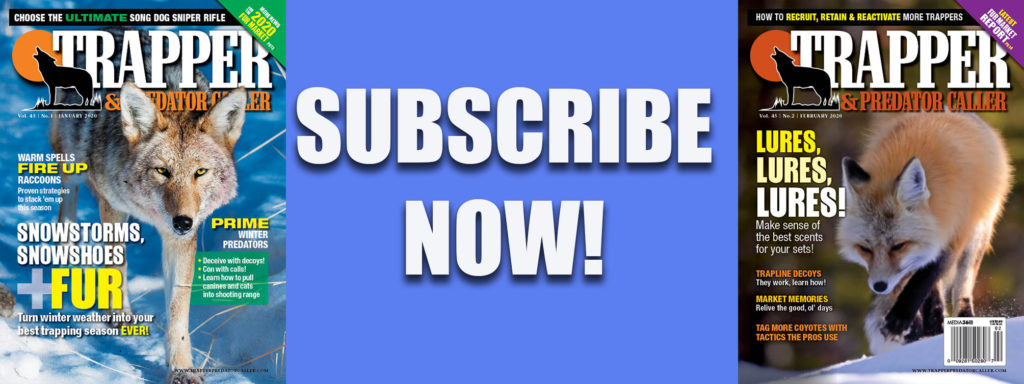The world of fur sales came to an abrupt end in March 2020, just as everyone feared, as the world decided to combat COVID-19. Fur routes were cancelled, drop-ins blocked, and the big auctions sales that were scheduled to start the selling season of 2020 have been postponed. It is surreal to see a huge industry completely stop, but I am sure that most of us see similar impacts elsewhere in our lives. It is not my role here to tell you how to deal with confinement, how to fight this virus, or how to survive the loss of a job that may have impacted some people. The impact on the world of fur sales is now a disaster, and probably the last thing we needed after trying to revive a collapsing market.

Every auction, fur sale, fur collection, everything is on hold for an undetermined period of time. When things come back to normal in two months, three months, maybe even six months from now, the whole world will need to get turning again before we can expect to talk about fur sales.
Uncertainty kills luxury, and right now, all we have is uncertainty. No one know what the final effects of the Coronavirus pandemic will be, no one knows when it will stop, no one knows how many businesses will shut down as part of the social confinement measures and the stop on travel imposed worldwide. The products may have a use, they may even have a demand. But, if we cannot get the buyers and sellers together, or get the products moving, nothing can be done. We all sit and wait (literally!) for things to unfold, and the forecast varies depending on where you live.
As I write this in early April, the situation is not yet at its worst in Canada nor the United States. The worst has yet to come for the spread of the virus. Nothing can or will be done to move skins until the travel bans are lifted, until we can get people together again safely in the same room, and until we can even explore what is left of the demand.
Uncertainty kills luxury, and fur is a luxury item. When the economy struggles and people lose their jobs, their energy goes into “survival mode” and basic needs are taken care of first and foremost. Staying healthy. Keeping your house. Feeding your family. Protecting the goods you already have. Luxury consumption requires consumer confidence in the economy: “I have spare money that I do not need, and I will not need it in the future because life will be good to me again.” This is what consumers must be able to feel to consider luxury purchases. If you have spare money now, but fear the loss of your job, the collapse of your business, most likely you will hang on and store that extra cash, waiting to see how things unfold. You will choose the insurance of your basic needs over luxury.

The Trapper’s Fur Market expert Serge Lariviére.
The uncertainty that looms over the world right now, not only over the health of the people, but also over the economy, is a devastating blow to the fur trade. And we were already close to the bottom of the barrel with struggling markets for almost everything except coyotes and bobcats. Coyote trim fueled the market thanks to parkas with luxury fur trim. Western bobcats sold at sky-high prices for sky-high priced luxury jackets. I am not saying that no one will be able to spend the money buying these things now, but there surely will be fewer people. In times of crisis, people revisit their priorities. People re-examine what is most important to them. People make do with what they have already. And people think about the future a lot more before spending on spur-of-the-moment items. Uncertainty kills luxury, period.
Every auction, fur sale, fur collection, everything is on hold for an undetermined period of time. When things come back to normal in two months, three months, heck maybe even six months from now, the whole world will need to get turning again before we can expect to talk about fur sales. For now, it would be foolish to talk prices and expectations as we simply do not who, where, when or what will happen in the next few months.
The luckiest trappers were able to sell their goods already before this hit. Others have to wait and see. I cannot tell you the market will fall, and I certainly cannot tell you that this is good for the industry. I have not heard a single positive linkage between the pandemic and the market. But, I have heard a few doomsday scenarios. Obviously, the pandemic is hitting us hard and depriving us of normal enthusiasm and optimism. The fur industry is being hit full-force by a global pandemic while the industry was already in its weakest state.
Surviving is tough when you are healthy and strong — surviving is a lot more difficult when you are already weak. I expect some will fall. Buyers that purchased goods in cash early and now cannot move them will not be paid, and will have to float the interest charges. Auction houses that needed liquidity will have to wait even longer. Brokers who supply fur to manufacturers for retail stores will lose clients if stores shut down, and shuttered stores mean zero fur out the door, and inventory left over. If you do not need any fur, you will not buy. And nothing will help kick the prices up.
Uncertainty kills luxury. As trappers and producers of wild fur, we have to do our best to help the world get rid of this uncertainty as soon as possible.

